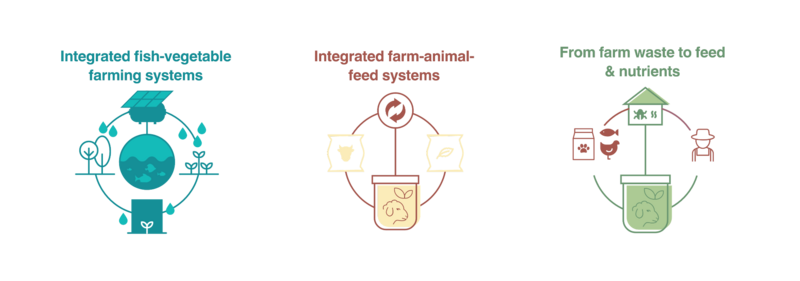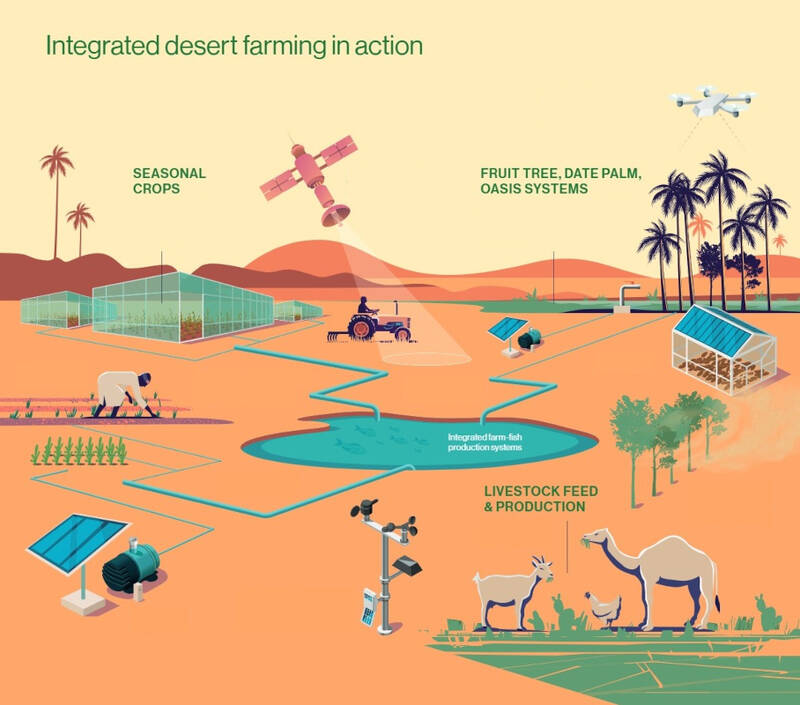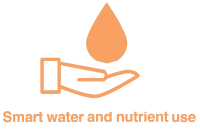


The Integrated Desert Farming Innovation Program (IDFIP) is a CGIAR innovation led by ICARDA in partnership with the International Water Management Institute (IWMI), International Food Policy Research Institute (IFPRI), and WorldFish, and supported by Gulf Cooperation Council (GCC) countries.
IDFIP aims to turn deserts into food production powerhouses by delivering demand-driven combinations of evidence-based agri innovations that reduce water and energy use, optimize fragile agro-biodiversity, and rehabilitate degraded land.

Deserts cover about one-third of the Earth's land surface. They are characterized by little rainfall, sandy soil, scorching winds, and high reliance on often non-renewable groundwater, making agriculture a daunting prospect. Yet, desert farming still feeds millions of people across the dry regions of Central and West Asia, North Africa, and the Middle East. But as the climate crisis deepens and populations grow, unsustainable water management and inappropriate land-use practices put their food and nutritional security at grave risk. Resilient and sustainable desert farming is now a critical area for agricultural research. IDFIP recognizes these challenges and aims to transform deserts into highly productive and profitable farming systems.

IDFIP aims to bridge the gaps between organizations, institutions, countries, the private sector, and farmers, working together for the greater good of dryland communities and operating on the principle of collaboration and integration. It brings together knowledge, expertise, facilities, and funding mechanisms to enable users to select and integrate combinations of technologies tailored to specific challenges. The program integrates traditional 'oasis' methods with cutting-edge technology while building on current desert industry pillars such as date palm production.
IDFIP aims to accelerate agricultural innovations along field-to-fork value chains. The program leverages 40+ years of ICARDA's/CGIAR's established foundations in improved water management, climate-smart crops, integrated crop/livestock systems, and efforts to reduce desertification. It also embraces technological innovation breakthroughs in water and soil productivity, artificial intelligence, integrated pest management, digital extension services, and food policy solutions.



The impact of IDFIP is far-reaching. For GCC partner countries, the program envisions numerous positive outcomes over five years. It anticipates direct positive benefits to 30,000 entrepreneurs across the region, creating job opportunities and boosting local businesses. IDFIP also aims to reduce energy consumption and freshwater use by 80% through converting 10,000 greenhouses to solar energy. The program highlights the importance of smart water and nutrient management, including fish farming in greenhouses and oases, recycling water up to six times, and utilizing it as nutrient-rich irrigation for crops and fruit tree plantations. IDFS aims to lower fertilizer costs, increase access to natural nutrients, and enhance dietary food security by implementing organic vermicompost technology and Integrated Agriculture-Aquaculture.

Additionally, IDFIP recognizes the significant potential of date palm production. By applying enhanced farming practices and quality assurance measures, the program strives for a 66% increase in date production, reaching global markets with 2.5 million tons of dates. This expansion contributes to economic growth in the region while ensuring a sustainable and thriving date industry. Ultimately, IDFIP in GCC countries acts as a test case, generating vital lessons and outcomes essential for scaling innovation packages beyond the borders of the Arabian Peninsula, extending into North Africa and Central and West Asia, and reaching global drylands.
-----------------------------------------
The project team is happy to answer your questions and open discussions with you on opportunities for transforming the future of farming in your desert areas. Please get in touch with Abdoul Aziz Niane, ICARDA Regional Coordinator, Arab Peninsula Regional Project Email: [email protected]